You probably shouldn't have drank that breast milk, Ryan Davis.
By rjaylee 1 Comments

He will be missed greatly.

He will be missed greatly.
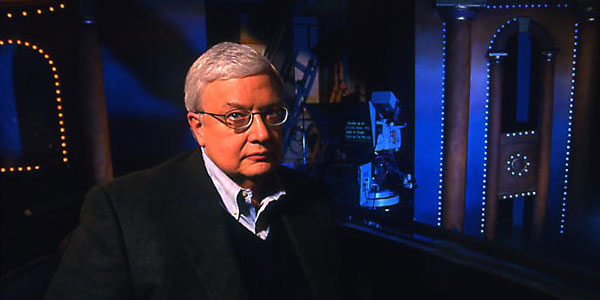
It was never about whether you agreed with his opinion, or even what movie he was writing about - even when you completely disregarded those factors, it was always about Roger Ebert's ability to craft an interesting, critical opinion to his audience. That was what made him such an inspiration to so many writers.
Roger Ebert passed away today. He was 70 years old, fighting a battle against cancer for over a decade of his last years.
Even in the days before the widespread existence of the internet, I still have many fond memories of Roger Ebert when I was younger, staying up far past my bedtime just so I could watch Siskel & Ebert discuss the latest, the greatest, and the worst movies of the time. I can say with a good amount of confidence that watching them on television in the early 90's was the first time I had ever paid attention to people critically thinking and discussing about movies, let alone any other subject matter.
Regardless of how you were introduced to Roger Ebert's legacy, he will remain an inspiration to anyone who writes critically about any medium. He will be missed - even by a fledgling writer such as myself. I could only hope to write something this beautiful, this unequivocally smart, this incredibly thoughtful, when I am one year away from my own deathbed.

Today, Disney officially closed down the development and publishing arms of LucasArts, in the effort of shifting the business model of LucasArts to become more of a "licensing house" for their intellectual properties. Chiefly among those properties, include the Star Wars and Indiana Jones franchises.
The analyst/realist part of me says this isn't entirely a surprise for LucasArts - not since 2010's Star Wars: The Force Unleashed 2 have they put their eggs into any kind of basket for a serious large-scale video game release, where public and critical response to that game was tepid at best. Considering the massive vault of intellectual property they sit on top of, it's not like they were short of any kind of franchise material to leverage. Yet somehow, they still managed to creatively bankrupt themselves in the end, with such a narrow focus on only Star Wars products. Their latest notable failure was the publicly-lambasted Kinect Star Wars, which was published by LucasArts, but developed externally by a various number of developers. Regardless of such, their ineptitude to even remotely capture any substantial part of the video games market to remain relevant in the past few years just means that this been a long time coming, with very little to show for it.

It's safe to say that anybody with a shred of humanity is wishing well for the men and women behind the scenes that lost their jobs at LucasArts, and a sad feeling of nostalgia is high because of the exceptional games released in the 90's that LucasArts has come to be known and popularized for. The Secret of Monkey Island series, Sam & Max, and Psychonauts are just a small, but powerful sampling of games that have defined LucasArts to their once-large fanbase. But assuming Disney can even remotely do a good job at licensing out the intellectual properties that they still hold (which Disney probably won't given their spotty track record in producing successful video games), most can probably realize that those franchises are best put into the hands of others for development, should any of them be realized yet again.
Ultimately, LucasArts was the figurehead for those classic LucasArts games that we romanticized and hold close to our hearts, but it is important to recognize that the true figureheads of that company were the people that stood behind it in it's period of high popularity and success. Those people include Tim Schafer, Ron Gilbert, and Steve Purcell - all who are flourishing on their own outside the old banner of LucasArts - flying their own unique flags, and most importantly, on their own terms, for brand new video game experiences.
How's my driving? Leave me a comment, come hang with me at my personal blog at http://thedevilshaircut.wordpress.com/, or follow me on Twitter.
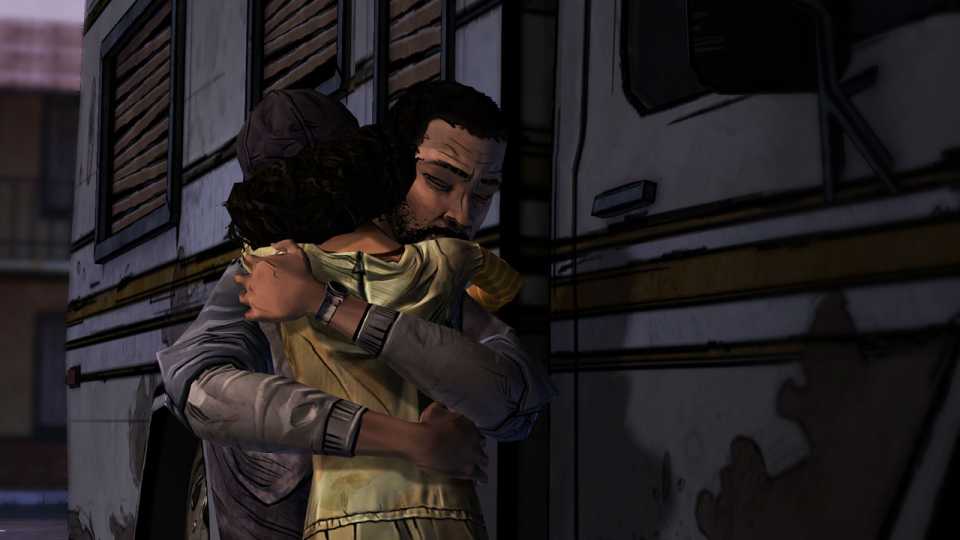
Kirk Hamilton wrote an interesting article on Kotaku about how the next Splinter Cell game would feature 'interrogation sequences', which in the previous game, Splinter Cell:Conviction, featured playable torture sequences as the title's main protagonist, Sam Fisher. It really got me thinking - although maybe not on the subject matter he intended. While he was trying to wrestle with the issue regarding how poor military intelligence in reality could be mirrored in video games, I was more intrigued to think about how player agency and choice has evolved since it has been more widely introduced into today's modern games, and the actual immersion it tries to create as a result from those choices.

While Kirk didn't really get the answer to the question he was actually trying to ask, I found it really interesting to hear Maxime Béland speak about how a player starts to "see the matrix" of decisions and starts to play the game's decision system rather than the actual morality play that is presented through the plot, which pretty much was the result of the "Paragon" and "Renegade" choice system of the Mass Effect games. This was fine for what it was back when the Mass Effect games were released, but the fact remains that Mass Effect was not the most adept at exploring morally grey areas. It was all very clear and symbolic throughout the entire game as to which choices would affect your playthrough, and the gameplay systems behind those decisions were reinforced to push the player along a relatively singular path to experience. Maybe you didn't really know the actual plot outcome of each Paragon or Renegade decision in Mass Effect, but you generally always had a good idea of which decisions were related to either associated path.
Having played Splinter Cell: Conviction previously, I can start to understand Béland as he tries to explain these "moral grey areas", even when there is not an explicit player choice given to the player. Sure, Splinter Cell: Conviction had some flaws as a video game, and your level of immersion may vary, but I was still able to put myself into Sam Fisher's shoes, as the game outright throws into your face as to what has happened and what your motives should be. My daughter was murdered. I need to find out who did it and why at any cost, even if that meant smashing some mercenary guy's head into a urinal and bathroom mirror for that information.
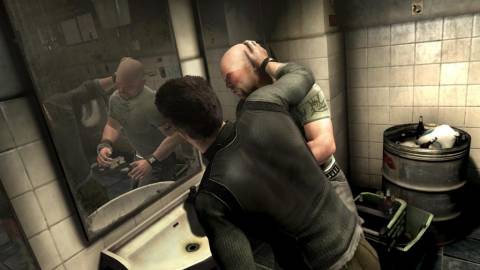
Yes, torture for any reason is gross, disgusting, and also dark part of American history in the wake of 9/11 - but I had to ask myself, did I carry on and enact the torture sequences simply because the game is commanding an instruction? Or did I do this because I actually wanted to get the information I need to avenge my daughter's death? At the time, I was immersed enough to actually believe it was for the latter. I wanted satisfactory justice for the injustices. But realistically speaking, does that really make it any better? Does my qualified immersion into the plot as Sam Fisher in his situation, out-qualify the distasteful act of torture? These are legitimate questions to be asked.
Be mindful - I'm not asking whether or not I would myself, force and act of torture upon another living being. I never would, and like any sane person, I recognize the line of reality vs. fiction no matter the media I am consuming; even if the media vehicle itself is putting me behind the trigger of the act. I am in Sam Fisher's shoes, but only through empathy, I am feeling what he feels. It's still simply a video game.
In more recent game releases, I think it's relatively safe to say that one of the most powerful examples of this kind of emotional exploration into "moral grey areas" is The Walking Dead by Telltale Games. Unlike the Mass Effect Franchise, no option is perfectly labelled blue or red for Lee Everett and Clementine. No situation can offer the perfect solution to put you down the perfect path. Thanks to the highly-acclaimed and superb writing of the series, Telltale allowed us to take our focus away from "the matrix of decisions", but instead focus on the actual situation and events that are presented.
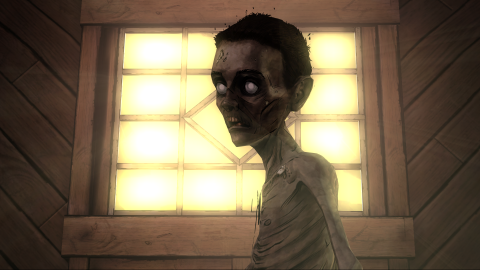
I don't like saying it because it's a terrible trope to say, but if you didn't put yourself completely into Lee Everett's shoes in The Walking Dead, you were kind of playing this game incorrectly, for the lack of a better term. As coarse as a statement this is to make, I understand this is not necessarily the fault of the player if their interests are not fully captured. But without this, a player would never be able to fully lower their emotional walls to succumb, immerse, and wholly put themselves into Lee Everett as he journeys with Clementine through the zombie apocalypse. Simply put, If you couldn't get to that level of immersion, then your own personal morality may have never been fully realized through Lee either, meaning your personal morality probably wasn't a strong factor in The Walking Dead's player agency and choices for how you handled The Walking Dead's morally grey-area events and dialogue. Rather than projecting your own personal morality into Lee Everett's decisions, you were alternatively fulfilling an ideal vision for your version of Lee Everett, to the best you possibly could as the events unfold in front of him.
If you couldn't put yourself completely into Lee's shoes with your decisions being a reflection of your own morality, you more or less had the same experience I had when I played as Sam Fisher in Splinter Cell: Conviction, where grey-areas are explored only as a spectator through the actions of a virtual character, as opposed to the virtual character being closer to an avatar-like depiction of yourself. By immersing myself as deeply into The Walking Dead as I did, it truly multiplied and magnified the level of emotional connectivity I could potentially have to the characters themselves, living through the many morality plays that The Walking Dead had to offer, placing the results and ramifications of those events closer to my heart. This wasn't your typical fiction anymore. It became a mindful experience through the perspective of another, with a legitimate vehicle to drive a large piece of your own personality.
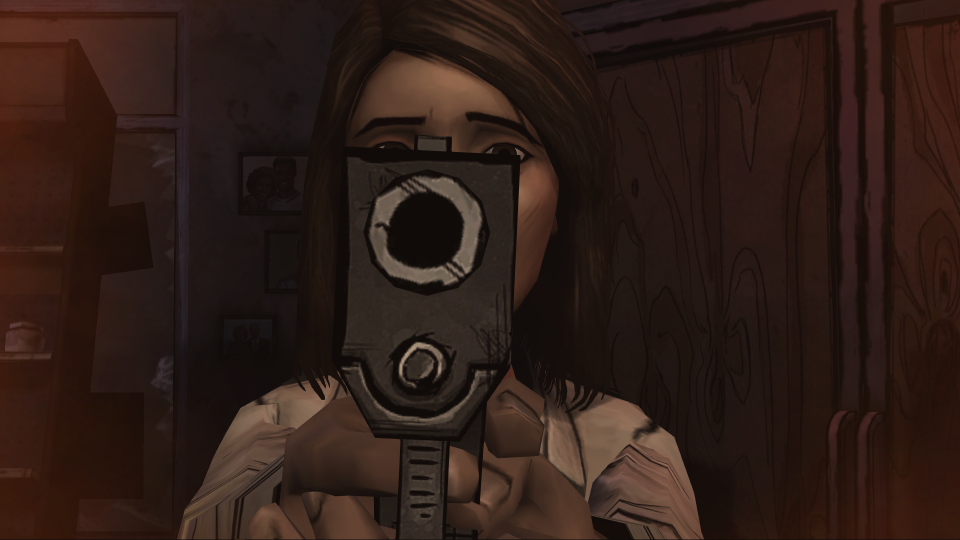
By virtue of Kirk Hamilton's article, I came to the realization that yes, a game like Splinter Cell: Conviction can be a really great venue in giving a player introspective about different kinds of issues through experiences of varying levels of morality. It puts the player into a position to be legitimately asked questions regarding it's morally grey-areas. But looking upon a tremendous game like The Walking Dead that offers the perfect vehicle for player agency and choice, it doesn't just ask you questions about morality - it forces you to answer them. In my mind, that is the true power of creating emotionally-conscious player agency in video games today.
Sure, in regards to The Walking Dead, many people mention that in the end that things never resolve any differently for Lee and Clementine, no matter what choices you made. I still don't believe that was the point, however. How I emotionally felt about leaving Clementine behind in the zombie apocalypse was a unique and personal conclusion in itself, completely regardless of the fact that what actually happens in the end is the same for everyone else.
Often, we forget that video games are not always about the destination's end; but in fact, it is completely about the journey and the ride of how we got there.
If you find my ranting to be somewhat thoughtful, come on over for some milk and cookies on my personal blog at http://thedevilshaircut.wordpress.com/, or follow me on Twitter.
Just watched the "new" Mass Effect 3 endings. Given the fact that I wasn't exactly up in arms about them in the first place, even though I agreed that the literal inconsistencies were confusing and misleading, the new endings...
...are pretty good. They deal with a lot of the literal inconsistencies and are filled in nicely with a lot of things like seeing the Normandy escape Earth, and seeing where it crash landed was just a spot to land for repair, only to take off again later.
The 'Synthesis' ending still is a bit too "space magic-ish" for whatever that is worth, but it's still obviously the most harmonious and the one I actually like best because I had a strong connection to Eve's character and the plot points through the entirety of the series regarding the dissonance/harmony between humans and A.I.
The 'Destroy' ending is probably the most straight-forward. I personally didn't like it that much, but I also would have never gone down that path either. Not sure why Garrus would even remotely assume Shepard is still alive though. That part doesn't make any sense whatsoever, although if we were to believe the indoctrination theory to be true, it still makes some sense with the final scene with Shepard still surviving. I still have this gut feeling of "ugh" though, because this of course leaves everything open as a "YO DUDES MASS EFFECT 4, CATCH IT".
The 'Control' ending is probably the best ending, even if it's not the path I would have chosen. I think indoctrination theorists are going to probably think this is the most 'right' ending, possibly alongside the 'Destroy' ending.
The 'Refusal' ending is kind of dumb and unnecessary. I mean, it's alright, but it leaves the most open and doesn't address the direct inconsistencies. Maybe should of had Shepard shoot himself/herself in the head or something for an added kick. It's a little easier to see past this ending if I regarded it as some dumb Easter Egg or something.
Overall, I do like that none of these endings address the absolute truth regarding the indoctrination theory itself. Regardless of it being true or not, these endings (aside from the Refusal) still totally work and clarify a lot of the actual inconsistencies of the ending.
First and foremost, I have no interest to discuss any of the Mass Effect 3 endings in here, nor will there be any spoilers or discussion about the singleplayer campaign. That horse has been kicked far into it's grave, and I really don't care to speak about it anymore.
With that out of the way, can I take a moment to dispel some things I've been hearing about Mass Effect 3's multiplayer and the negative buzz it has been getting in some circles? Among the multitude of commenting waves of those who choose to discuss only the game's endings, It seems that some crowds are talking about shunning Mass Effect 3's multiplayer and how it's microtransactioned, or how it only seems to be a straight-forward ripoff of the Gears of War Horde mode. Let's get try to clarify a little bit of this.
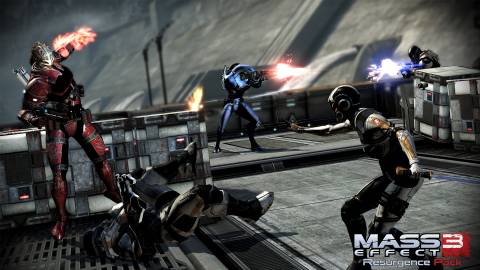
To start off, yes, you can pay using real money to buy the booster item packs, but realistically you shouldn't need to spend any real money here. Aside from being completely optional to spend real money, the in-game credits you accumulate are more than enough to buy new items with, assuming you can come out of a single round victorious. A victory on the hardest Gold difficulty easily nets you enough credits (around 70,000) to buy the most expensive booster item pack (costs 60,000 credits) for at least one "rare" or top-tier items. Obviously it's an extreme longshot for a new player to even remotely see a victory here, but a victory in the easiest Bronze difficulty nets you around 17,000 credits, which is just about enough for the middle-tier item pack (20,000 credits). These middle-tier booster packs offer "uncommon" level items, and are more than viable enough to give a player some decent gear to start building a character with. Some notable pieces of "uncommon" level gear which can carry even into the hardest Gold difficulty include:
FYI, I am not including the "Premium Spectre pack" in this conversation, as it's a limited time on-and-off booster pack, that costs 99,000 credits - but offers 2 guaranteed "rare" items. And yes, I wish there was a trading system in place to help deal with some of the randomness of the items that get handed to you when buying the items pack.
If anything, I think maybe the main problem is people seem to be unable to get through all the way to the end of the 10 waves to garnish the full amount of credits, likely even on bronze, the easiest difficulty. Frankly speaking, I think there's simply a lot of people who have bad character builds (or possibly may not be that skilled at shooters). To the credit of these people, it isn't explained very well as to how to build an effective character or how to play certain classes to their best strengths, and even on the easiest Bronze difficulty, the enemies can come at you far harder than anything found in main singleplayer campaign.
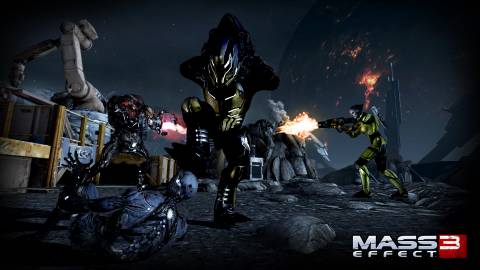
There's a lot of RPG elements involved that people may not realize, as it's not just "SHOOT DUDES". Typical RPG elements like class specialization, aggro, crowd control, DPS (sustained and burst), elemental damage, ability synergy/combinations, line of sight, stealth, and party buffs are important factors to consider. I mean, you can play it just as "SHOOT DUDES", but you're not going to be the most effective, and it's going to end in more failures if everyone is playing it like a straight 3rd person shooter. I think a large part as to why some people may find the multiplayer bland or generic is due to this fact - people simply aren't exploiting their class powers enough, to take advantage of the deeper elements of the combat system. Again, I don't entirely fault the player for this - there simply isn't much in way of tutorial or description for this beyond the very minor descriptions in the character skill tree/powers menu.
I could probably talk at length about all those RPG elements and give a general guide as to how to effectively play Mass Effect 3 multiplayer, but I'll maybe save that for another time. As far as I can tell, it's maybe just a little too easy for people to shun Mass Effect 3's multiplayer with a generic blanket-statements of ignorance, just because it wasn't originally built as a multiplayer game, among other things. Those things probably warrant their own discussions as well.
Ultimately, I think Mass Effect 3's multiplayer should get a little more credit for what it brings to the table, especially with the surprising depth when the expectations of it were so low. It has a good share of it's own problems as well, but I think as it was Bioware's first attempt at an online experience in a territory that they haven't really explored before, it's a pretty solid.
Anyways, let me know what you guys think.
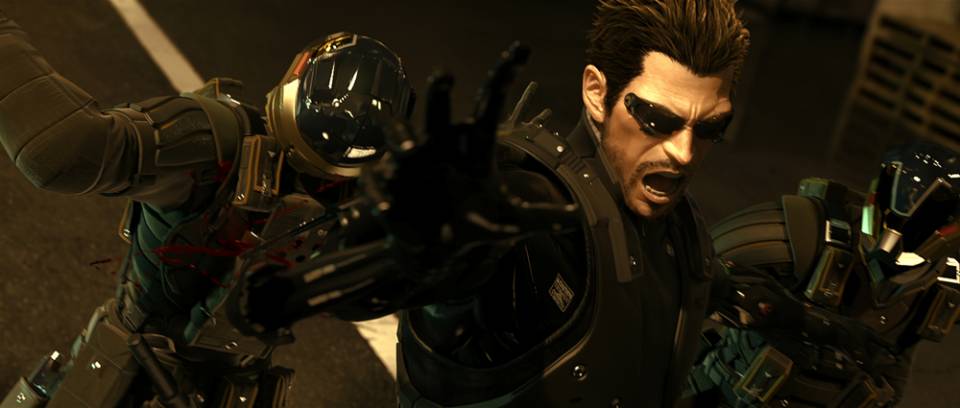
In light of Alex's article about GameStop forcibly removing OnLive coupons from boxed units of Deus Ex: Human Revolution, I just don't know if I can deal with GameStop opening up shrink-wrapped SKU's and then reselling them, and I still don't think the methods they took were exactly tactful or business ethical. It's easy for almost anyone to say "well that's kind of weird", but I thought I'd give a little more insight than what seems to be the blanket statement of "GameStop sucks".
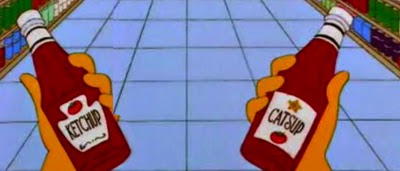
If nobody knows what I’m talking about when I use the term ‘SKU’, SKU is an acronym that stands for ‘Stock Keeping Unit’, which is defined as a unique boxed product unit. For example, a 355mL can of Coke for the United States is a single unique SKU, and a 355mL can of Coke for Mexico is a completely different and unique single SKU. Another example of SKU’s in the context of video games would be an NTSC copy of Deus Ex: Human Revolution with the Canadian bilingual language packaging, or the NTSC copy with only English for the rest of North America. PAL or the Augmented/Limited Edition designations would also all have their own unique SKU.
Even though the game on the inside might be exact same disc, a separate and unique SKU is given to every uniquely packaged product for items that may require any kind of variation. Whether it is a different language instruction manual, a different DVD case, or the inclusion of a promotional OnLive coupon, each unique packaging of a product is defined as a SKU.
In GameStop's defense, yes, it has every right to protect it's competitiveness in a retail market regardless of opinion about the archaic nature that video game sales in a physical retail box store. However, you might not have been aware of the fact that retailer chains actually get to participate in SKU compiling decisions, especially when it comes to things such as pre-order bonuses. In fact, this is not a new concept to Eidos Interactive at all.
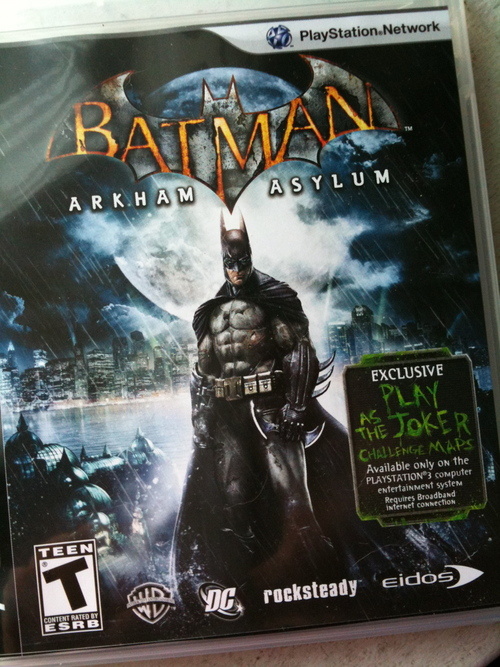
Eidos Interactive also published Batman: Arkham Asylum in 2009, which when released, had a pre-order exclusive incentive from GameStop/EB Games to include an extra "challenge map", while other stores had differing bonuses, or none at all.
When the game was shipped to retailers, that SKU with the GameStop-exclusive content was shipped only for GameStop to sell because it had the pre-order bonuses packaged inside the packaging with the game disc. It's not always apparent on the box (unless you scanned the UPC), but in this case, those unique GameStop SKU's of Batman: Arkham Asylum had a unique GameStop/EB Games sticker on the front, whereas a retailer like Best Buy would have received a completely different SKU with different packaging.
Knowing this, if GameStop wanted to complain about the SKU of Deus Ex with the OnLive coupons inside because it infringed on their competitiveness, GameStop should have raised it's voice to Eidos long before when these decisions about the retail SKU's were being hammered out to begin with.
You may also be asking why other products get a pass when it comes to being sold as 'brand new' even though they've technically been 'opened' in some way, or could be used in some manner. Some examples can include cars, musical instruments like drums or guitars, clothing, or furniture. So why can't video games have the same sales policies and norms?
To be blunt, different products, different businesses, different policies, and different markets. Let me explain.
In the case of video games, GameStop is uniquely notorious for breaking open their shelved units of sealed video games, yet they will still sell the product at full retail price. There's two major barriers for video games that show a customer that without a benefit of a doubt, that the video game has not seen any use or tampering, which guarantees the customer that he/she is receiving what they expected:

If any of these things have been broken (especially the official product DVD case sticker), then it should be completely reasonable that the customer can fully question the product's authenticity, reliability, expected value, and actual value.
Yes, if you go to a store, and buy a TV or piece of clothing, you can inspect the product previous to purchase as to making sure it fulfills all their respective properties of a 'brand new' product. However, those products don't have the same norms and applications. Televisions and clothing don't suffer from the same kinds of market problems such piracy. Yes, there are 'knock-off' authenticity issues, but I'm not just saying that a product has to suffer from piracy to be uniquely different. What I'm trying to say is that the very definition of 'brand new' can be variably different across all products sold in a retail marketplace, and is defined by the product's market itself and the conditions surrounding it.
For instance, if I inspect a brand new television after buying it, I have the commercial freedom to bring it back to the retailer and either receive a full refund (usually within 30 days), full store credit, or full cost replacement. As dictated by the retailer's store policies, this is a normal practice among retailers that sell TV's, and well within the expectation of the consumer for all other retailers.
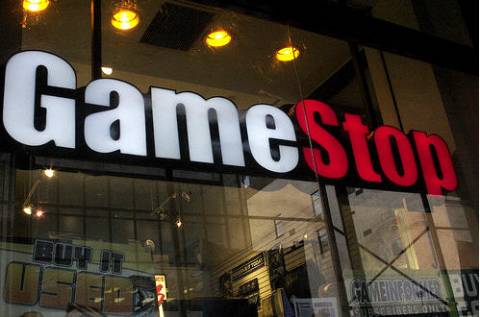
With video games however, I do not have the same level of consumer freedom, and the expectation is completely different. As soon as I open that shrink wrap and official product seal sticker after buying it brand new, I've already devalued my purchase. According to common store policy, I'm taking back a used product and my product purchase will only be reimbursed as a used product, even if I bought it and opened it only seconds later.
Knowing this about video game retail store policy, the fact GameStop as a business can open a brand new product (which according to their store policy should be a used game because of a broken seal) and then resell it and fully market it as a brand new sale, does not inspire confidence to consumers, let alone it being highly questionable and contradictory to their own store policy. But like I said previously, retailers dictate their own store policies, so take a term like "commercial freedom" with a grain of salt.
When it comes down to it for Deus Ex PC customers, it shouldn't have even come to this, given the fact that GameStop is notorious for ripping open new copies of any game and sells it as brand new. This whole situation could have been completely preventable given some better planning and communication between the retailer and the publisher. While the process of opening brand new copies of Deus Ex and taking out the OnLive coupons wasn't illegal by any means, it definitely was ethically questionable.
When there are so many grey areas and variances in the marketplace regarding consumer rights as to what can be sold as 'brand new' for video games in retail, it's hard to take this situation as anything but negative from the perspective of a consumer, even when I completely understand from a business-standpoint why GameStop took the actions it did.
Sometimes a little tact and a little communication goes a long way.
Let me know what you guys think in the comments.
2011-08-25 Update: Just as I posted this and had it fully written, reports come out that Deus Ex: Human Revolution on PC is being pulled off the shelves from GameStop locations, and information has passed that Square-Enix did not inform GameStop that this coupon was going to be included at launch.
This doesn’t change my outlook on what I’ve written by that much, but I should be clear that it isn’t just GameStop that needs to communicate and plan better – but all parties involved, including Square-Enix/Eidos as well.
Buying used games is a dirty business, as in I’m pretty sure there is a lot of actual dirt on these used game boxes and discs. If your germophobia/mysophobia is keeping you from buying and enjoying used games, you should totally check out my personal blog over at http://thedevilshaircut.wordpress.com/, or follow me on Twitter.
After playing Terraria for few days now, I can definitely say it is pretty interesting fun. Having not played Minecraft, I was intrigued by the concept of the open-world sandbox, and wanted a game that delivered that concept. Minecraft is popular, but I was never too keen on the graphical style; or lack thereof, depending on your argument. I'll admit, I was much more keen on the art style of Terraria because the 2D character sprites reminded me of SNES-era Final Fantasy art. But I'm not writing this to review or talk about the merits or features of the game, so let me explain further with an introduction about my experience with the game first-hand, and how that developed.

When I first started, I knew from the get-go just build a house, fight off zombies and other monsters, then keep mining and building better and bigger things. As for the game telling you what you need and how to get very specific ingredients, it will at best only tell you the recipe for an item. The way you figure this out is by talking to your Adventure Guide friend, by showing him a material item (wood, stone, etc.), and he tells you everything that can be made involving that item, and what the other items are needed to craft it.
What it doesn't do however, is tell you where to find those other items. Sometimes it's very obvious, like copper, which anyone will know that you just dig it out of the ground along with any other variety of minerals of varying rarity. However, sometimes items that are more obscure like a hook, which you may not realize if it is a dropped item from a monster, or an item that is crafted, so you have to do a little more exploration in the game (traversal-wise or crafting experimentation with varying materials).
It's this exploration aspect that may turn people off from Terraria. Anyone can build a simple house, but as to progression in the game, it's not always clear which can cause the game to seemingly lose some focus. However, others may find this incredibly rewarding and fun just to explore and experiment away without any real high-level rhyme or reason. I was actually having a good amount of fun from this particular aspect, until I came across an object in the game which I was unsure about - the Dark Altar. So of course, being stumped, I looked it up online using Google. Soon enough however, I found myself doing this for more objects and multiple recipes for items, trying to find out how I can obtain even more powerful weapons and armor, which led to the eventual min/maxing of gameplay, which has entirely killed off the feeling of free exploration and experimentation which I held to be so highly rewarding. By containing my own singular experience without any outside influence, I was playing my very own true personal game of Terraria - not someone else's as depicted in a wiki or a FAQ.
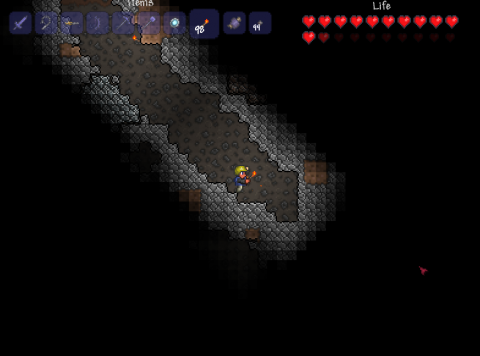
There was a lot to be said in just wasting a lot of time digging in tunnels not knowing what you are looking for exactly (other than to dig deeper and deeper). Whether you find this rewarding or fun at all is up to you. If you find that aspect of the game to be an important part of the fun, don't look up ANYTHING online for hints on the game. I made that mistake, and now I've effectively killed my open-world sandbox by turning it into an objective-based game in an open-world setting, expecting to reach some form of an end-game.
So my advice for all - make sure you know how you want to experience the game. I know this really comes down to a deeper discussion as to how people play games and the concept of min/maxing, but I normally am pretty conscious about this kind of thing specifically before I play any kind of game, especially those with RPG-like systems.
Anyways, let me know what you guys think, or if you guys have had experiences similar to this regarding Terraria or other games.
If you’re interested in experiencing sandboxes in open-worlds, or experiencing open-worlds in sandboxes, check out my personal blog over at http://thedevilshaircut.wordpress.com/ or by following me on Twitter.
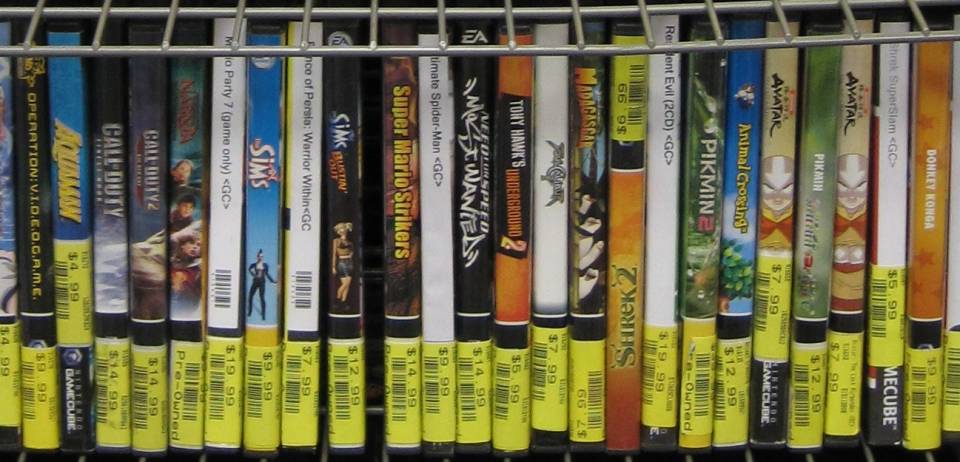
The biggest problem I see is that a lot of people don't understand why there is a big fuss about used game sales and why online passes are in place from companies such as EA, Activision, or other game publishers. As a consumer, the most front-facing thing we notice is that if we buy a game used, we most likely have to buy a $10-$15 code to allow online play, which can instantly negate a discount we receive from buying the game used in the first place from a retail chain such as Best Buy or Gamestop.
So who is the blame for this? Who is taking away our discount and why does it even exist?
The entire onus has to do with the business model and market structure being capitalized on for used game sales from retailer companies like Gamestop, Amazon, Best Buy/Future Shop, and other major retailers. Plainly put, retailers have a very well-placed business plan that is entirely intended to circumvent profits from the business model of brand-new video game sales, which in turn directly affect the profits seen by the publisher and the revenue contract developer. So how does this work exactly? Let's back it up and bit and explain.
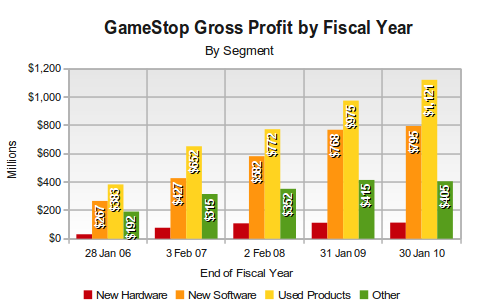
Part of this business plan from retailers involve aggressive incentives to get you to trade-in your games for store credit, which lets them stock up on used game units to re-sell at a higher profit margin. It significantly costs a retailer less money to give an aggressive consumer incentive to trade-in, than it does to just purchase stock that is brand new and shrink-wrapped from a publisher and pushing to sell that instead.
If you've walked into a Gamestop, you immediately notice just how hard their aggressive incentives are, with them trying to get you to trade-in games with full $25 store credits on premium titles, or trading in 2 or 3 used premium titles for one brand-new premium title. With such high incentive for the customer, it floods the retail market with used game stock in all these retailers, causing the publisher to lose significant profits due to a much lower demand for a retailer to buy brand-new shrink-wrapped copies.

On the consumer end, we don't really care about anything else if we see a game without an online pass system. All we see are games being sold at lower prices, and we buy them up because hey, who doesn't love a discount. There's nothing really wrong with this from the perspective of the consumer, and it was never an issue in the past because used games were not entirely common with the very limited incentive on trading in games back in the day. Other factors in contrast to the past include video game development costing significantly less back then, but I'm not here to discuss that. Speaking directly from a price point, renting video games was also a much larger business in the past during that time as well, but I'll speak a little more about that later.
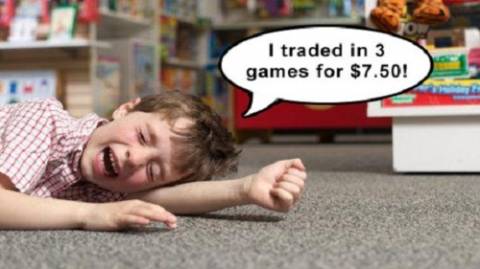
If I wanted to be more consumer friendly, I could easily say sure, used games are a good thing because as a consumer, we just reap the benefits of lowered prices on games, and directly see a benefit even if the retailer's pockets get full. However, I can't in the right mind say that it's entirely fair for the developers, who see no part of this retailer-only revenue from used games. Developers are only able to actualize profits if the publishers are able to sell more brand-new units (or on contractual DLC sales), and if retailers have a system in place to circumvent that demand for brand-new games because of their generation of demand for used game sales, developers end up on the short-end of the stick. As noted before, the costs of game development are significantly more expensive these days, and unless they receive a considerable amount from a publisher as an investment grant, the developer has to bite the pill on the costs of development until they can sell their game.
It's already hard enough in between a publisher and a developer, and I can't help but think used game sales cause them to bite that pill even harder than they need to. It's reasons like this which cause me to believe the online pass system is important. While it may cost us a extra couple bucks, it's a system intended to keep things fair in between the retailer, publisher, and the developer, and I'm totally okay with that.
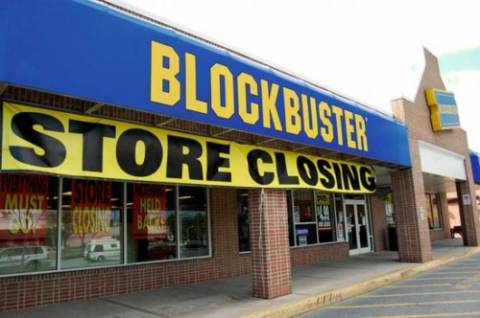
When talking about game rentals, the publishers contractually receive a large sum of money for their games which in part, the developers can see some revenue from, so that is not an issue. However, when speaking from a consumer's view, it does indeed sort of suck. To be fair however, the format of a video game simply has changed and evolved beyond the format it was when video game rentals were first conceptualized. Unfortunately, the business model and direction of video games have always been built with the intention of being bought at full price for an individual, and game rentals have always been an afterthought.
While I wouldn't know where to entirely point the finger, it's pretty easy to believe that the rental business like Blockbuster was simply not able to adapt to the changes in the business landscape of video games and the internet, much like they weren't business landscape of movies and the internet. It's the only real justification I have for this, but I think it makes sense. Either way, I really can't start pointing and wagging my finger at the publishers and developers until they start deciding to do something stupid like the locking up of offline content using an online pass, or something similar.
If there's one thing I want to set straight, it's that I'm never against consumer choice and straight up a hefty discount being offered to consumers is a good thing. Video games are a fair market item after it's been bought off the shelves, and has every right to be exchanged in a way that the first-hand consumer wishes. These are all good things which keep the prices of video games a little lower in rougher economical times. Where I have the dispute however, is the fact that used game sales is a hugely profitable business, where it is managed and fed solely by retailers, where they see all the revenues based on black hat marketing and feedback-loop sales techniques.
I don't expect anyone reading this to have a full understanding of how the business of retailing works, or even further back in the business chain on how games are decidedly sold from the perspective of the guys who wear the suit and ties, but hopefully this brings a little insight into a world that is beyond your $60; or less, plus the $10 or $15 if you buy a game used.
If you don’t feel like spending your money on online season passes, or trading in your used games for an insultingly small amount of cash, you can always get a better deal by checking out my personal blog at http://thedevilshaircut.wordpress.com/, or by following me on Twitter.
Log in to comment